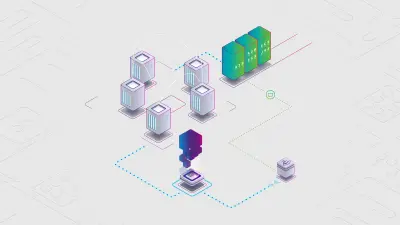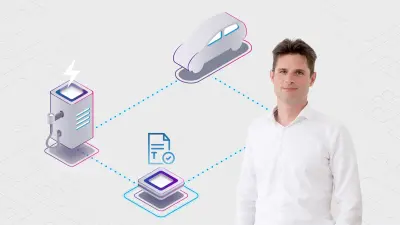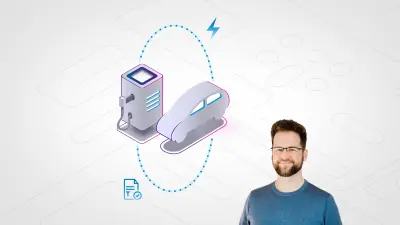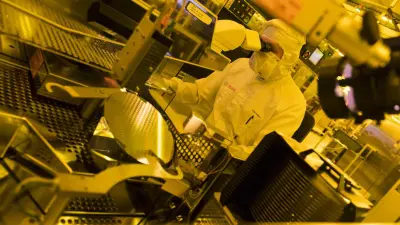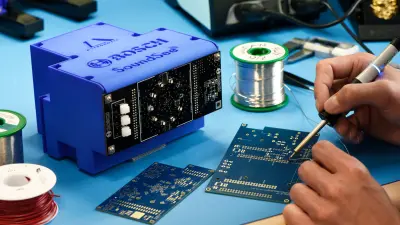The road to a trustworthy digital “Economy of Everything”
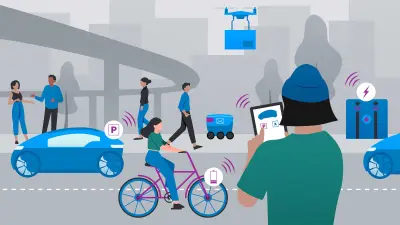
Imagine a world of connected devices that do not just upload data to the cloud, but actually generate value and exchange that value with people and other things/machines. This is what Bosch refers to as an EoT – an Economy of Things. Led by Nik Scharmann, the team of the strategic advance engineering project of the same name is looking into the question of how to establish a digital ecosystem that will be economically successful in the long term and enable networked devices to conduct secure, trustworthy transactions with each other for citizens and companies alike. “It is about making cross-organizational data usable in a way that complies with data protection – not just for the purpose of direct monetization of data, but to draw conclusions from data that will improve interactions and processes in everyday life and industry,” says Nik. However, how and where would a vehicle find a suitable parking space on its own? How do a car and a parking space agree on business terms? How do they conduct the transaction and payment? The team’s proposition is that what is conceivable for the mobility sector can also be transferred to the manufacturing industry, energy markets and consumer markets. People and machines act in digital space – and so can machines with machines. In principle, the interactions can be between anything.
Hand in hand with AI
Artificial intelligence (AI) is set to play an ever-increasing role in this. “Secure, trustworthy calculations using data provided by several companies and players are the key to the success of distributed data. After all, both the raw data fed into the system and potentially also the resulting data model need to remain confidential,” says Nik. “In our opinion, collective learning based on decentralized technologies such as DLT is a decisive factor in cost-effectively creating a digital socio-economy.”
Decentralized? Centralized? Balanced organization and technology
Of course, key technologies and concepts are needed for an Economy of Things. But more than anything else, there has to be a way of managing all the players in such a way that the benefits of the ecosystem are at the forefront of the transaction for all parties. For an Economy of Things to be operated openly, neutrally and sustainably, and without a platform operator working in a similar way to a monopoly, it needs a regulatory framework for all participants in the network (good governance) that transparently describes the necessary structure and the process of collaboration. The rules of governance are defined in contracts, providing the cooperation with legal certainty and stability. The challenge is finding the optimal balance between revising and defining the framework. “Ensuring a cooperative data space is robust requires both technological and organizational decentralization,” says Nik, adding: “Realistically, a completely decentralized organization cannot make any decisions, because the processes would be too complex. Additionally, a fully decentralized technical infrastructure is likely to be too expensive and too slow to be competitive.” A trustworthy organization should therefore manage to both distribute the decision-making authority within the organization across several parties and distribute the operation of the technical infrastructure so well that it can be operated independently and efficiently.
Good governance does not stand still. It adapts constantly to its changing environment and jurisprudence.
Key technologies and concepts
such as blockchain for conducting business (e.g. via smart contracts) on decentralized marketplaces
as a decentralized approach for mapping usage rights and payment systems (crypto-economic tokens) digitally on shared platforms
as a decentralized identity system for data protection and data sovereignty of (legal) persons and things
for encrypted, automated, multi-party calculations on decentralized marketplaces
as software agents that act independently on decentralized marketplaces on behalf of the things and their owners
as an approach for collaborative learning – possible on decentralized platforms in conjunction with blockchain technology
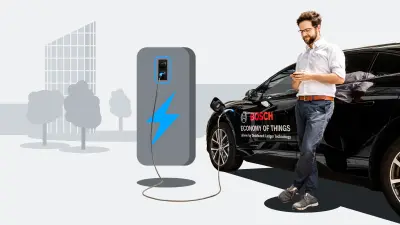
Research framework and goal
Bosch Research is contributing its wide-ranging expertise in good governance, AI, decentralized technologies and open marketplaces to the following collaborative data space projects.
GAIA-X is a project that is working to establish a high-performance, competitive, secure and trustworthy data infrastructure for Europe. It is supported by representatives of business, academia and administration from Germany and France and by other European partners. It aims to develop common requirements for a European data infrastructure.
Catena-X sees itself as a rapidly scalable, expandable ecosystem that everyone involved in the automotive value chain can participate in equally. The aim is to provide an environment for the establishment, operation and collaborative use of end-to-end data chains along the entire automotive value chain.
The goal of the IDunion consortium is to establish an open ecosystem for decentralized identity management that can be used worldwide and is based on European values and regulations. It offers everyone the opportunity to manage their identity information themselves and decide when and with whom this should be shared. It is important for individuals to have sovereignty over their own data, especially when it comes to highly sensitive and personal information.
The objective of the publicly funded iBlockchain project is to comprehensively and systematically research solutions based on blockchain technologies for industrial applications. The project team is analyzing and evaluating the relevant technical and economic principles. Appropriate blockchain protocols and smart contracts are being examined.

Previous large-scale cooperation projects involving data platforms have shown that conventional organizational structures are not conducive to working efficiently in the long term. At the same time, fully decentralized digital platforms cannot replace organizations! The objective of the research is therefore to combine technical decentralization and central management bodies to ensure the best possible economic system.
Governance principles of the Economy of Things
Openness
Cooperation is open to all participants.
Neutrality
No single participant is to dominate the cooperation.
Transparency
Business model, organizational structure and decision-making processes within the cooperation are transparent to all participants at all times.
Integrity
The participants are clearly identified – in compliance with data protection.
Sovereignty
There is no existential dependence between participants in the cooperation.
Sustainability
Achieving jointly defined overarching goals is at the heart of activities.
Strategic perspective
Bosch is looking to use its competitive advantage from its wide-ranging experience in combining IoT and AI to open up future business opportunities. In the coming years, Bosch is predicting sales of AI-enabled products will be worth billions. Bosch Research links the IoT and AI approaches with DLT-based ecosystems.
Summary
Bosch Research is working together with partners on the vision of establishing economically successful digital ecosystems that are open, fair and transparent thanks to their decentralized approach, while complying with data protection and security requirements at the same time. This development is known as the democratized web, Web 3.0 or the crypto movement. Companies such as Bosch are therefore not aiming to achieve platform dominance, but rather are trying to create competitive IoT solutions, for example. The platform itself is used jointly as a digital infrastructure.
Research Updates
Keep up to date with the latest ideas and impulses from Bosch for an Economy of Things.
Get in touch with our expert
Nik Scharmann
